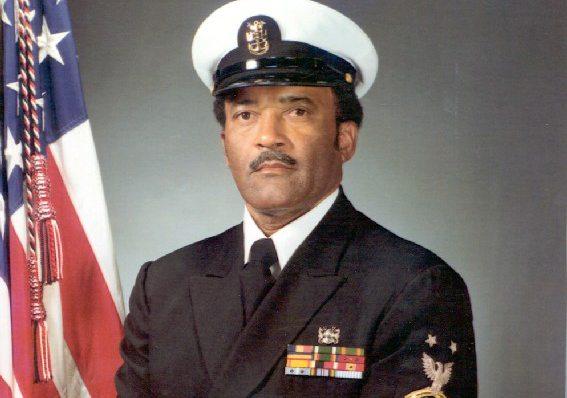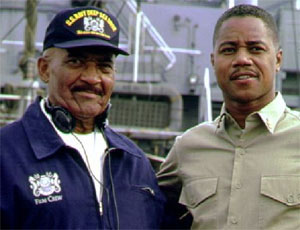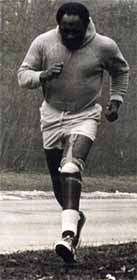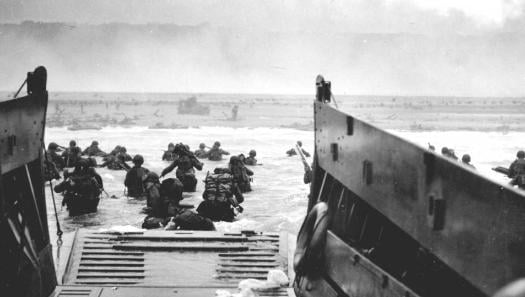Military & Veterans Life
Cover Story: Carl Brashear

Brashear in the movie, called him the
strongest man I have ever met.
"Don’t let anything hold you back," is the fatherly advice received by Carl Maxie Brashear, who broke racial barriers in the US Navy in 1948, "And of course I didn’t."
These words inspired Brashear throughout his extraordinary life, which ended this past week when he died of heart and respiratory failure at the age of 75, at the Naval Medical Center in Portsmouth, VA.
After enduring threats from white shipmates and efforts by Navy officers to sabotage his career and take his life, Brashear emerged as the Navy’s first African American deep-sea "Master" diver. His elite diving status even survived a major life-threatening accident which resulted in a leg amputation. His story was told in the highly acclaimed 2000 movie "Men of Honor," starring Cuba Gooding Jr. in the lead role, as well as Robert DeNiro.
"The movie could well have been called ’Man of Courage,’ " said Paul Stillwell, former director of the history division of the U.S. Naval Institute at Annapolis, Md. "The amount of determination and persistence he had and the pain that he put up with was amazing."
Actor Cuba Gooding Jr., who played Brashear in the movie, called him "the strongest man I have ever met."
"He is a symbol of inspiration … a true example of greatness not only to the African American community but to any race today that aims to achieve in the military," Gooding said.
Racial Barriers Broken
A 31-year military Veteran, Brashear’s career started in 1948, the year the U.S. armed forces were ordered integrated by President Truman. Brashear, the 17-year-old son of a sharecropper from Sonora, KY, enlisted in the Navy after being declined by the Army.
"I went to the Army office, and they weren’t too friendly," Brashear said in 2002. "But the Navy recruiter was a lot nicer. Looking back, I was placed in my calling.
"Growing up on a farm in Kentucky, I always dreamed of doing something challenging. When I saw the divers for the first time, I knew it was just what I wanted."
By law, the Navy’s doors were open to African Americans, but signs of segregation continued to exist. Assigned to the naval station at Key West, Fla., Brashear first prepared meals for white officers in the officers’ mess. And threats came his way often early in his career.
"Hate notes were left on my bunk. People just weren’t ready for a segregated Navy; they didn’t want me to make it through the program," he said. Specific threats were made against his life by drowning.
Diving, in the minds of most, was reserved for whites. Brashear, undaunted by the odds, wrote to the Navy Diving School, asking for admittance. He wrote his request to the Navy more than 100 times before being admitted in 1954, and was finally allowed into the diving school in Bayonne, N.J. In 1960, after several years as a Navy salvage diver and earning his high school equivalency diploma, Brashear entered the Navy’s deep sea diving school.
Physical Adversity
In 1966 he was well on his way to achieving his goal of joining the Navy’s elite "Master Diver" ranks when two U.S. Air Force planes collided off the coast of Spain and a nuclear weapon fell into the water.
The salvage ship Hoist, to which Brashear was assigned, was sent to retrieve the weapon in January. A large pipe being used in the attempt to lift the bomb "came loose, flew across the deck, and struck my leg below the knee," Brashear told Stillwell. "They said I was way up in the air just turning flips."
By the time he arrived at a hospital hours later, doctors thought he was dead. He was about to be sent to the morgue when one doctor found a faint pulse. Brashear recovered, but his injuries were severe and eventually, a portion of his left leg was amputated. While such an injury virtually guarantees retirement from the military, Brashear refused to give up his dream. He wanted to dive.
As he told Stillwell in his interview:
"About the third or second of December, they gave me a leg, and I made a statement to the doctor. "Doctor," I said, "once I get a leg, I’m going to give you back this crutch, and I’ll never use it again. I’m going to walk back to the hospital."
"No way! No way you can do that! Impossible!" doctors told him.
"The day they strapped that leg on me, he said in the interview with Stillwell, "I gave those crutches back to those people, and I don’t have one today, never used one, don’t have one in the house, and I walked back to the hospital."
He ignored his discharge papers, refusing to sign. Instead, he transferred back to diving school with his new prosthetic leg.
"It’s not a sin to be knocked down," Brashear told the Salt Lake Tribune in 2002. "It’s a sin to stay down." He broke a second barrier in the Navy as the first amputee to be restored to full active duty as a diver.
In later years, Brashear continued sharing his story through talks before a wide range of groups, including college students and corporations.
He is survived by three sons from his first marriage, one of whom, Phillip, a helicopter pilot in the Virginia Army National Guard, was brought back from the war in Iraq last week because of his father’s deteriorating health. A fourth son died in 1966. Brashear was also the grandparent of 12 and great-grandfather of two.




